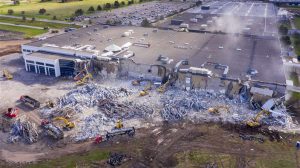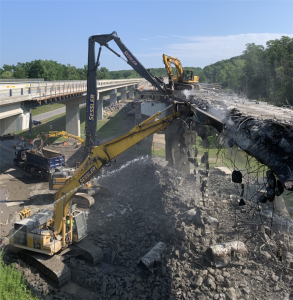Professionalising Demolition: Bruce Sherman on Safety and Speaking Up
By Demolition & Recycling International, Demolitionandrecycling.media
BY LEILA STEED | OCTOBER 2024
 Bruce Sherman, Director of Business Development & Marketing at Sessler Companies, speaks with Leila Steed about the ongoing professionalisation of the demolition sector, the growing focus on safety, and why it’s essential for contractors to be more vocal.
Bruce Sherman, Director of Business Development & Marketing at Sessler Companies, speaks with Leila Steed about the ongoing professionalisation of the demolition sector, the growing focus on safety, and why it’s essential for contractors to be more vocal.
In recent years, the demolition industry has seen significant transformations, largely driven by a concerted push towards continued professionalisation and enhanced safety measures.
Speaking exclusively to D&Ri, Bruce Sherman, Director of Business Development & Marketing at Sessler Companies, says one of the most notable advancements has been the broad acceptance of safety standards, which he feels have truly taken root within the industry over the last decade.
“It’s incredible how much the industry has changed,” Bruce observes.
“Historically, safety was often seen as a secondary concern, but now it has become a primary focus, thanks to initiatives such as the National Demolition Association’s (NDA) certified demolition supervisor courses, the creation of the NDA Demolition Safety Manual, and numerous best practice whitepapers developed by industry professionals.
“These courses and resources are not just for estimators or project managers but are designed for the on-site teams who face daily challenges and have the responsibility of implementing best practices and safety protocols.
“It’s our field teams who do the actual work and who are seeing the challenges when it comes to methods and safety practices,” Bruce notes.
Bruce believes that by addressing these concerns directly, the industry is actively “cleaning up its act.” This shift, he adds, is helping to raise the profile of demolition as a serious, professional sector.
A key part of this professionalisation is the effort to create career pathways specific to demolition, which, until recently, had largely been lumped under general construction.
“Demolition has always been essential and vital, yet it was treated as a subcategory,” Bruce explains.
Now, with initiatives like the NDA’s demolition technician certification in the works, he sees the industry moving in the right direction. “It’s great to see demolition being recognised as its own field. It’s a critical part of construction, but with its own unique challenges and skillsets.”
However, Bruce admits that public perception is slow to catch up. While those in the industry are keenly aware of the advancements, the public often still sees demolition in a more traditional light.
 “People often view demolition as just the destruction of buildings,” Bruce says, but with the industry’s growing focus on sustainability, recycling, and environmental responsibility, he knows there’s a much more nuanced story to tell.
“People often view demolition as just the destruction of buildings,” Bruce says, but with the industry’s growing focus on sustainability, recycling, and environmental responsibility, he knows there’s a much more nuanced story to tell.
“Demolition contractors have always been at the forefront of recycling materials – long before regulations required it,” he points out.
In fact, Bruce estimates that in bridge demolition, for example, up to 99% of materials—such as concrete, steel girders, and rebar—are recycled.
Bruce is passionate about changing the narrative around demolition, both within the industry and in the public eye. One area he feels strongly about is the need for contractors to be more vocal about the good work they do.
As he took on the marketing responsibilities for Sessler Companies, he noticed a stark contrast between how demolition companies operated and how they presented themselves.
“A lot of demolition companies didn’t put much thought into their websites or public image. Some hadn’t updated their websites in years,” he recalls. But that’s changing.
More and more companies are recognising the importance of showcasing their work and engaging with the public.
“It’s exciting to see firms starting to invest in their marketing,” says Bruce, who believes that being more vocal about the industry’s contributions will help shift public perception.
Though he acknowledges that part of the challenge is dealing with the emotional reactions that often come with demolition projects, especially when iconic or sentimental structures are involved.
“People feel a connection to old buildings, whether it’s a school they attended or a factory where their grandfather worked,” he says, adding that it’s important for companies to engage with these communities and explain the positive aspects of demolition.
 Despite these challenges, Bruce is optimistic about the future. He sees the industry’s growing professionalisation as a way to not only improve safety and efficiency but also to attract new talent.
Despite these challenges, Bruce is optimistic about the future. He sees the industry’s growing professionalisation as a way to not only improve safety and efficiency but also to attract new talent.
“For a long time, demolition was something you were either born into or stumbled into,” he says, referring to the many family-owned businesses, like Sessler Companies, that dominate the sector.
Now, with clearer career pathways and increased visibility, he hopes more people will see demolition as a viable, long-term career.
Looking ahead, Bruce is confident that Sessler Companies—and the industry as a whole—will continue to thrive by adapting to new challenges, particularly in areas like environmental sustainability.
With an increasing number of clients focused on low-carbon projects and demanding that materials from demolition sites be recycled, Bruce believes the industry is well-positioned to lead the charge in sustainable practices. “We’ve been recycling materials for years, so in many ways, we’re already ahead of the curve.”
As the demolition industry continues to evolve, Bruce is clear on one thing: contractors need to step up and take ownership of their role in the wider construction landscape. “We have a great story to tell,” he says. “It’s time we started telling it.”


